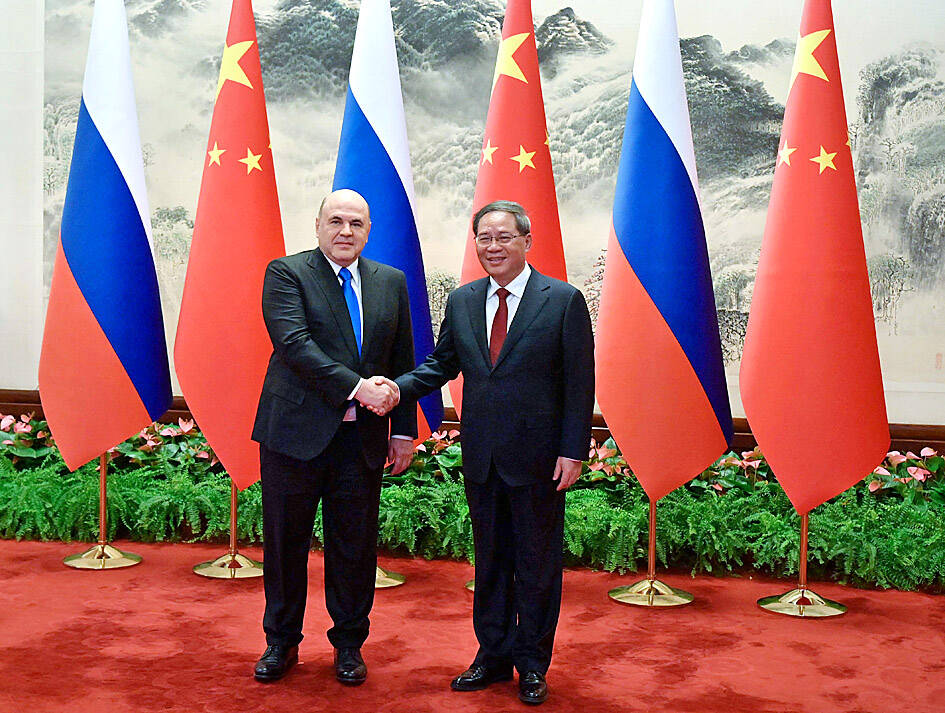Russian Prime Minister Mikhail Mishustin yesterday hailed “unprecedented” relations with China despite sanctions pressure from the West as he met with his counterpart in Beijing.
Mishustin arrived in China on Monday, attending a business forum in Shanghai on Tuesday before traveling to Beijing to meet Chinese President Xi Jinping (習近平) and Chinese Premier Li Qiang (李強).
It is the highest-level visit by a Russian official to China since Moscow invaded Ukraine last year.

Photo: AFP
“Today, relations between Russia and China are at an unprecedented high level,” Mishustin told Li after a welcoming ceremony outside Beijing’s Great Hall of the People. “They are characterized by mutual respect of each other’s interests, the desire to jointly respond to challenges, which is associated with increased turbulence in the international arena and the pressure of illegitimate sanctions from the collective West.”
Li hailed the “comprehensive strategic cooperative partnership between China and Russia in the new era.”
“I believe your trip to China this time will definitely leave a deep impression,” he said.
Li said that bilateral trade had already reached US$70 billion so far this year.
“This is a year-on-year increase of more than 40 percent,” he said. “The scale of investment between the two countries is also continuously upgrading. Strategic large-scale projects are steadily advancing.”
Following the talks, ministers signed a series of agreements on service trade cooperation and sports, as well as on patents and Russian millet exports to China.
Mishustin is in China with top officials, including Russian Deputy Prime Minister Alexander Novak, who handles energy policy.
China last year became Russia’s top energy customer as Moscow’s gas exports otherwise plummeted due to a flurry of Western sanctions over the invasion of Ukraine.
Russian state media reported that Novak on Tuesday told a forum in Shanghai that Russian energy supplies to China would increase by 40 percent year-on-year this year.
Analysts say that China holds the upper hand in the relationship with Russia and that its sway is growing as Moscow’s international isolation deepens.
The leaders of both countries are “brought together more by shared grievances and insecurities than by shared goals,” said Ryan Hass, a senior fellow at Washington’s Brookings Institution and a former White House official. “They both resent and feel threatened by Western leadership in the international system and believe their countries should be given greater deference on issues implicating their own interests.”

STILL COMMITTED: The US opposes any forced change to the ‘status quo’ in the Strait, but also does not seek conflict, US Secretary of State Marco Rubio said US President Donald Trump’s administration released US$5.3 billion in previously frozen foreign aid, including US$870 million in security exemptions for programs in Taiwan, a list of exemptions reviewed by Reuters showed. Trump ordered a 90-day pause on foreign aid shortly after taking office on Jan. 20, halting funding for everything from programs that fight starvation and deadly diseases to providing shelters for millions of displaced people across the globe. US Secretary of State Marco Rubio, who has said that all foreign assistance must align with Trump’s “America First” priorities, issued waivers late last month on military aid to Israel and Egypt, the

France’s nuclear-powered aircraft carrier and accompanying warships were in the Philippines yesterday after holding combat drills with Philippine forces in the disputed South China Sea in a show of firepower that would likely antagonize China. The Charles de Gaulle on Friday docked at Subic Bay, a former US naval base northwest of Manila, for a break after more than two months of deployment in the Indo-Pacific region. The French carrier engaged with security allies for contingency readiness and to promote regional security, including with Philippine forces, navy ships and fighter jets. They held anti-submarine warfare drills and aerial combat training on Friday in

COMBAT READINESS: The military is reviewing weaponry, personnel resources, and mobilization and recovery forces to adjust defense strategies, the defense minister said The military has released a photograph of Minister of National Defense Wellington Koo (顧立雄) appearing to sit beside a US general during the annual Han Kuang military exercises on Friday last week in a historic first. In the photo, Koo, who was presiding over the drills with high-level officers, appears to be sitting next to US Marine Corps Major General Jay Bargeron, the director of strategic planning and policy of the US Indo-Pacific Command, although only Bargeron’s name tag is visible in the seat as “J5 Maj General.” It is the first time the military has released a photo of an active

CHANGE OF MIND: The Chinese crew at first showed a willingness to cooperate, but later regretted that when the ship arrived at the port and refused to enter Togolese Republic-registered Chinese freighter Hong Tai (宏泰號) and its crew have been detained on suspicion of deliberately damaging a submarine cable connecting Taiwan proper and Penghu County, the Coast Guard Administration said in a statement yesterday. The case would be subject to a “national security-level investigation” by the Tainan District Prosecutors’ Office, it added. The administration said that it had been monitoring the ship since 7:10pm on Saturday when it appeared to be loitering in waters about 6 nautical miles (11km) northwest of Tainan’s Chiang Chun Fishing Port, adding that the ship’s location was about 0.5 nautical miles north of the No.